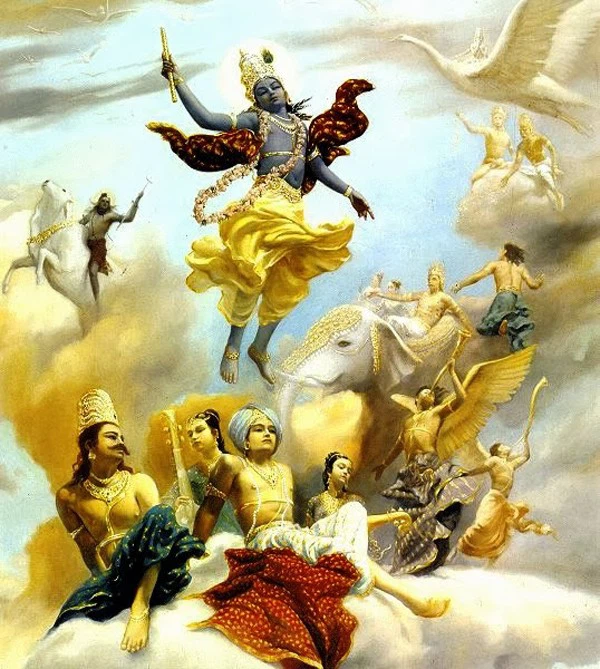Know Thy Paradise
Three types of Paradise find mention in scriptures.
- Historical paradise
- Worldly Paradise
- Subtle Paradise.
The term ‘paradise‘ has a relation to joy and pleasure. Any state that provides enjoyment and pleasure is in itself Paradise. The explanation for the three types of Paradise is as below.
Historical Paradise
The very first divine creations were in the Himalayas. As their population size increased, a need arose for anointing someone as the leader for able administration. A brilliant balanced one was appointed as the leader and given the designation ‘Indra. In turn, his place of residence got the designation ‘Indrapuri‘ and his kingdom as Paradise. It is in the Himalayas beyond the mountain of ‘Gandħmādhan. Near to it is the hometown (Alkapuri) of the divinity of wealth (Kuber), which finds mention in Mahābhārat. There is an episode where Bhīm, bringing the thousand-petalled lotus flower for Draupati, encounters Hanumanji.
“atħāpashyanmahābāhurgandħamādhanasānushu. suramyam kadhalīshanda bahuyojanavisthrtham”. Maha. bha. Van parv 146/50. 51.
The mighty Bhim saw a lovely garden of plantain extending up to many kilometres on the peak of Gandħamādhan.
“Sa gathvā nalinīm ramyām rākshasairabhirakshithām.
kailāsha shikharābhyāshe dhadharsha shubhakānanām”.
“kuber bhavanābhyāshe jāthām parvatha nirjharaiha.
suramyām vipulac’cħāyām nānādhrumalathākulām”. Maha. Bha. Van parv 153/1, 2.
This way on moving ahead, Bhimsen saw a beautiful lake near to the house of Kuber, closer to the mountain of Kailās and near the lake was a beautiful forest. That lake was filled with water from the many waterfalls.
The episode of ascending to Paradise by the five Pāndavās and Draupati finding mention in Mahābhārat is about their travel to the Himalayas only.
We can find descriptions in mythological texts about rivalry amongst the devout and austere ascetics for occupying the position of Indra. Many, including kings like Nahush and Sagar, ascetics like Vishwāmitr and Dhadħīchi, etc., were claimants, but Indra did not allow them to succeed.
The incidents of Indr hiding in fear of Hiranyakashyap, war with Rāvan, and losing to Meghnāth, etc., only prove that the Paradise finding mentioned in the mythological texts is nothing but the Himalayas. Similarly, even the incidents of Arjun going to Paradise and seeking blessings of Indra and other divinities and kings like Dashrath, Divodas, and Dushyant helping Indra in the war between Divinities and Demons also attest to this only. Furthermore, even in the scripture called ‘Meghdhoot’ scripted by Kālidas, Himalayas is only said as Paradise.
It also finds mention in scriptures that to keep intact the knowledge and wisdom embodied in Vedas and also for the welfare of the subjects, leaders (Prajapatis) like Daksh, Marīchi, Athri, Angirā, Pulasthy, Pulaha, Krthu, Bhrgu, Vashishŧ, and Nārad, etc., were appointed. Also, to maintain the administrative standards at the highest level, Indra, Varun, Yam, Kuber, Agni, Nīrithi, Maruth, Īshān, Brahma, and Ananth were nominated for the ten regions. It is so described in the 8th chapter of Cħāndogy’upanishad that Indra and Virochan had gone to the hermitage of Sage Prajapati for study. Whereas Virochan returned after 33 years of study, Indra remained there for 101 years seeking self-awareness. He returned only after the attainment of self-awareness. All these incidents also go to prove the Himalayas as Paradise.
Worldly Paradise
Enjoyment of happiness, joy, pleasure, etc., is referred to as Paradise while, facing trouble, unhappiness, sorrow, misery, etc., is known as Hell. Because of good and noble deeds, a soul takes physical birth in a family full of comfort and happiness, called ‘Worldly paradise.’ The Gita says so in this context.
“Prāpy punyakrthām lokānushithvā shāshwathīhi samāha.
suchīnām shrīmathām gehe yoga bhrashto’abhijāyathe”. Gita 6/41.
The soul of one who wanders in other forms of worship other than the yog form (meditation) incarnates and remains in the world of pious and virtuous ones for a long time and retakes bodily birth in the family of a pure and affluent family.
This verse mentions both the worldly and subtle paradises. Taking birth in an affluent and righteous family in itself is the enjoyment of worldly Paradise.
Subtle Paradise
Those who attain the state of Samprajnāta Samādħi (A first stage meditational state where duality still exists) can enjoy nature’s joys and pleasures by their mere desire. This state is known as the attainment of subtle Paradise.
Unlike in this world, there is no love, hatred, desire, sensual pleasure, etc., in the subtle Paradise. Only the subtle enjoyment of the five subtle senses or elements alone is available there. Divine smell, divine taste, divine beauty, divine touch, divine smell, and divine sound in the form of subtle elements are the ones that provide pleasure there. The enjoyment of happiness and joy of this world is like the smell of a rose flower, while the pleasure and delight of Paradise are like that of the essence extracted from the rose flower. There is a total lack of worldly sorrows and sufferings there. It is so said in Gita in this context.
“the tham bhukthvā svargalok vishālam kshīne punyo mathyarlok vishanthi”. Gita 9/21
Meaning: After enjoying the pleasures of subtle Paradise, the souls of good and noble deeds take bodily rebirths as humans again.





